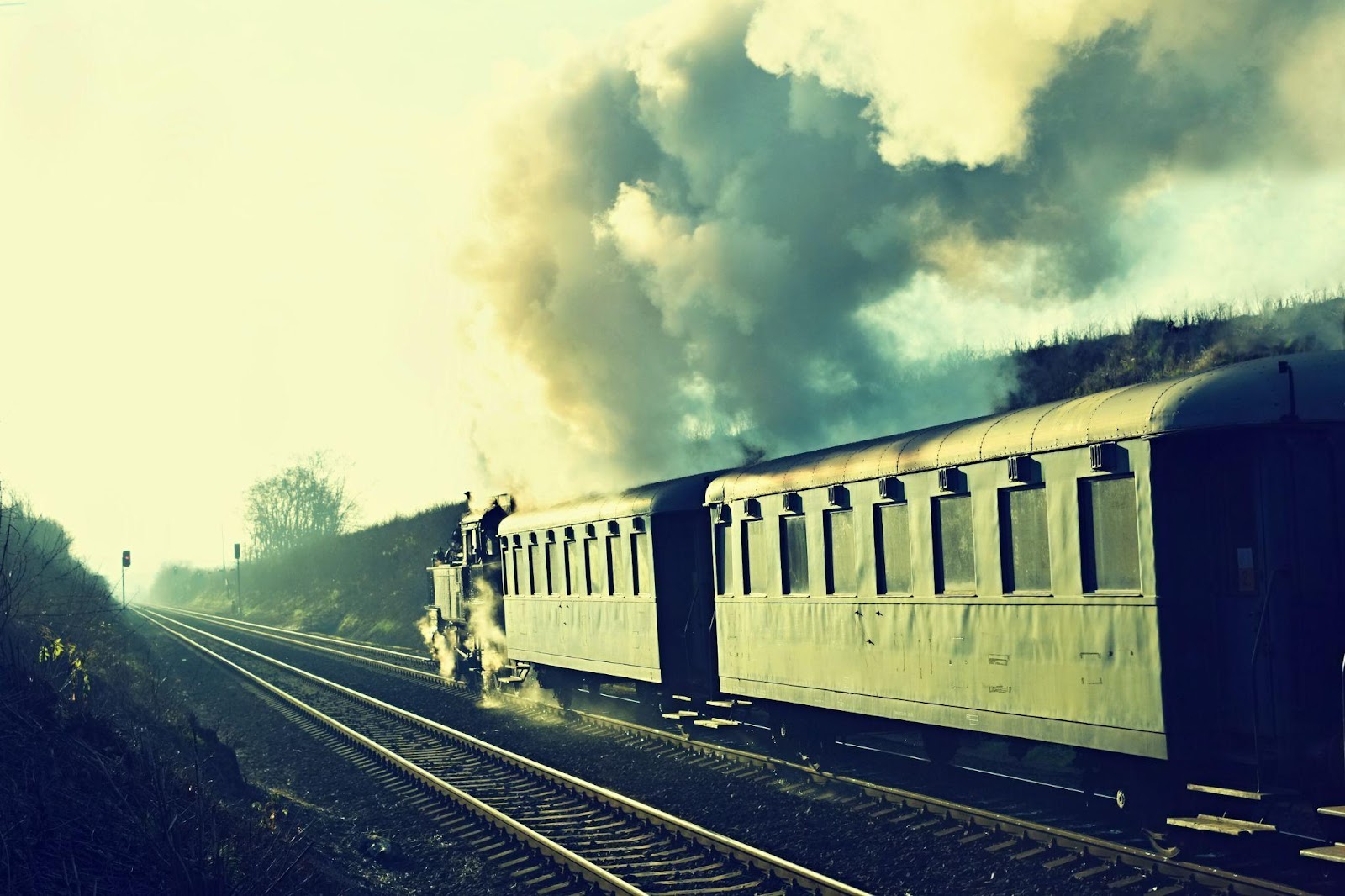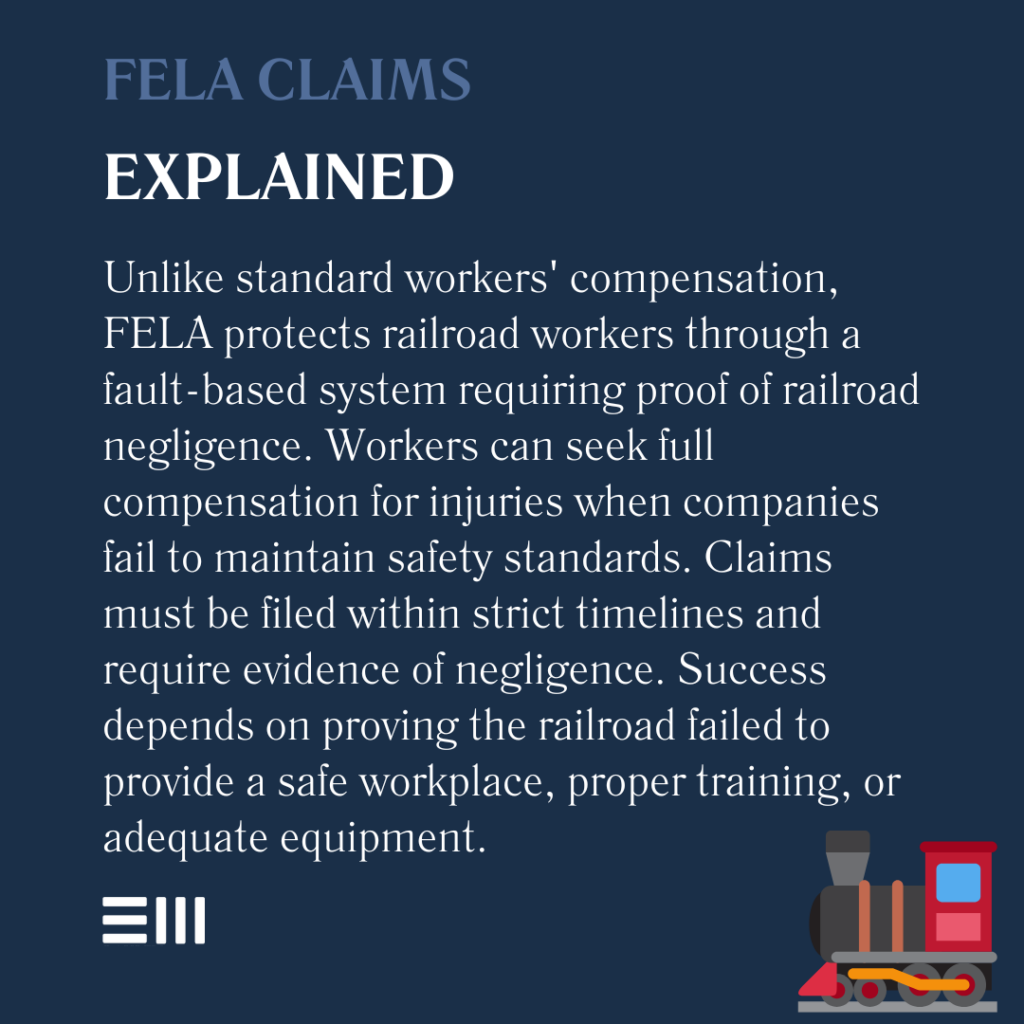
Every day, across Alabama’s 3,700 miles of track, massive locomotives thunder through cities and slice through quiet countryside, powering America’s freight network.
Since 2015, there have been 775 train-vehicle collisions in the state, causing over 320 injuries and claiming at least 72 lives.
Railroad workers climb aboard these steel giants, knowing each shift brings unique dangers. From Montgomery’s busy rail yards to rural crossing accidents near Mobile, the impact of train accidents reverberates through communities and families.
When steel meets flesh, when signals fail, or when safety protocols break down, lives change forever.
Understanding your rights—whether you’re a railroad worker protected by FELA or a citizen injured at a crossing—can mean the difference between struggle and security.
Understanding FELA Claims
The Federal Employers Liability Act (FELA) provides unique protections for railroad workers, differing significantly from standard workers’ compensation. These specialized regulations demand specific knowledge and approach.
FELA was enacted in 1908 to address the dangerous conditions faced by railroad workers, and its principles continue to evolve through court interpretations and legislative updates.
Essential FELA elements include:
- Fault-based compensation system requirements;
- Railroad company negligence standards;
- Safety regulation compliance requirements;
- Comparative negligence considerations;
- Statute of limitations timelines;
- Burden of proof requirements;
- Types of recoverable damages Jurisdictional considerations;
- Documentation and reporting protocols;
- Expert witness requirements;
- Settlement negotiation procedures; and
- Trial preparation standards.
Understanding these elements helps ensure proper claim handling and maximizes the potential for fair compensation under federal law.

Types of Railroad Accidents
Railroad accidents encompass various scenarios, each with unique investigation requirements and liability implications.
Different types of incidents require different legal approaches, and understanding the nuances of each category is crucial for building a strong case. Modern technology and safety systems have introduced new complexities into accident investigation and prevention.
Common accident categories include:
- Derailments and collisions;
- Grade crossing accidents;
- Equipment malfunctions;
- Switch and signal failures;
- Trainyard incidents;
- Platform and station accidents;
- Maintenance worker injuries;
- Chemical spill incidents;
- Electronic control system failures;
- Track maintenance accidents;
- Locomotive electrical fires;
- Cargo securement failures;
- Human factor incidents; and
- Weather-related accidents.
Each category demands specific investigative expertise and specialized knowledge of applicable regulations and industry standards.
Railroad Worker Safety Rights
Railroad workers possess specific rights under federal law regarding workplace safety and accident prevention. Understanding these rights helps protect workers and strengthen claims.
These protections extend beyond basic workplace safety to encompass comprehensive health and environmental considerations.
Key safety rights include:
- Safe work environment requirements;
- Proper equipment maintenance standards;
- Adequate training provisions;
- Personal protective equipment access;
- Hazard reporting procedures;
- Retaliation protection measures;
- Medical treatment options;
- Return-to-work protocols;
- Workplace environmental monitoring;
- Rest period requirements;
- Emergency response training;
- Health surveillance programs;
- Ergonomic workplace design; and
- Safety committee participation.
These rights form the foundation of workplace safety and provide essential protections for railroad workers in increasingly complex operational environments.
Crossing Accident Liability
Grade crossing accidents involve complex liability issues affecting both railroads and motorists. Understanding these factors helps determine responsibility and compensation rights.
Liability considerations include:
- Warning device maintenance;
- Sight distance requirements;
- Train speed restrictions;
- Motorist obligations;
- Railroad crew responsibilities;
- Local ordinance compliance;
- Federal regulation adherence; and
- Emergency response protocols.
Proper analysis ensures accurate liability determination.
Investigation Procedures
Railroad accident investigations require systematic approaches and detailed documentation. Thorough investigation builds strong cases and supports fair compensation.
Critical investigation elements include:
- Evidence preservation methods;
- Witness statement collection;
- Event recorder analysis;
- Signal system testing;
- Track condition assessment;
- Equipment inspection records;
- Environmental factor evaluation; and
- Documentation procedures.
These elements support comprehensive case development.
Common Injuries in Railroad Accidents
Railroad accidents often result in severe injuries requiring extensive medical care. Understanding injury patterns helps anticipate treatment needs and compensation requirements.
Typical injuries include:
- Traumatic brain injuries;
- Spinal cord damage;
- Crush injuries;
- Burn trauma;
- Amputation injuries;
- Repetitive stress conditions;
- Chemical exposure effects; and
- Psychological trauma.
Each injury type requires specific medical expertise.

Compensation Categories
FELA claims allow various forms of compensation beyond standard workers’ compensation benefits. Understanding available compensation helps victims pursue full recovery.
Compensation types include:
- Medical treatment costs;
- Lost wages and benefits;
- Pain and suffering damages;
- Future earning capacity;
- Emotional distress;
- Rehabilitation expenses;
- Family impact damages; and
- Quality of life changes.
Comprehensive compensation assessment ensures fair recovery.
Frequently Asked Questions About Alabama Railroad Accidents
Alabama railroad accidents generate complex legal questions requiring clear answers.
These responses address common concerns from victims and families.
How Does FELA Differ From Workers’ Compensation?
FELA requires proof of railroad negligence but potentially offers greater compensation than standard workers’ compensation.
Unlike state workers’ compensation systems, FELA allows for full compensation of all proven damages, including pain and suffering.
What Time Limits Apply to Railroad Injury Claims?
Specific deadlines govern FELA claims and crossing accidents, making prompt legal action essential. The statute of limitations can vary based on the type of claim and jurisdiction, with some claims requiring notice within days of the incident.
How Are Crossing Accidents Investigated?
Multiple agencies may investigate crossing accidents, following established federal protocols. Modern investigations often incorporate data from electronic recording devices, satellite tracking systems, and advanced signal monitoring equipment.
What Rights Do Railroad Workers Have?
FELA provides specific rights regarding workplace safety and injury compensation, including protection from retaliation for reporting safety violations or seeking medical treatment.
How Is Fault Determined in Railroad Accidents?
Investigation findings and evidence analysis establish responsibility percentages, often requiring expert testimony and advanced accident reconstruction techniques.
What Evidence Is Most Important?
Physical evidence, witness statements, and operational records provide crucial support, supplemented by electronic data recordings and modern tracking systems.
Your Path Forward After a Railroad Accident
Railroad accidents devastate lives and leave victims facing complex legal challenges. These incidents create ripple effects that touch every aspect of a victim’s life – from immediate medical needs to long-term financial security and family stability.
The path to recovery requires not just medical expertise but also legal guidance through the intricate maze of railroad regulations and compensation claims. Our experienced team understands both FELA requirements and railroad operations, bringing decades of combined experience in handling these specialized cases.
We combine industry knowledge with legal expertise to guide victims toward fair compensation, staying current with evolving regulations and industry standards.
Our commitment extends beyond the courtroom. Wwe work with medical experts, accident reconstructionists, and industry specialists to build comprehensive cases that address both immediate needs and long-term consequences. We understand that each case represents not just a legal claim but a family’s future and wellbeing.
Contact our office today for a confidential consultation about your railroad accident case. We’ll evaluate your situation, explain your rights, and help you pursue the compensation you deserve.
Can't find what you're looking for? Search our site below.










